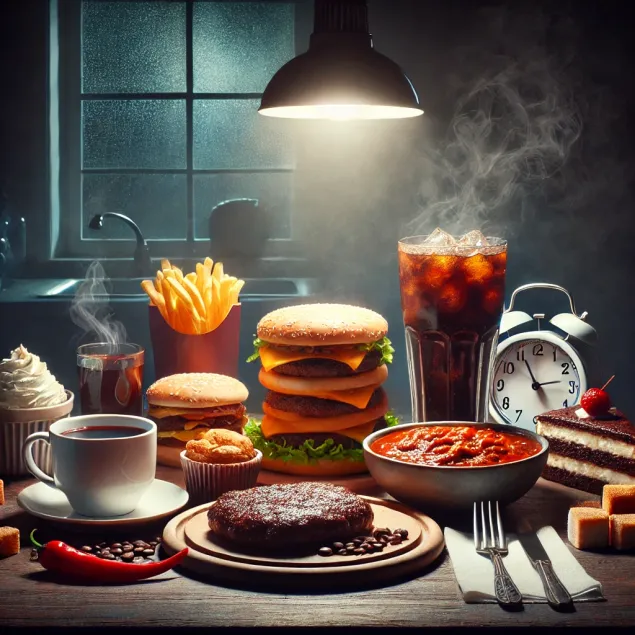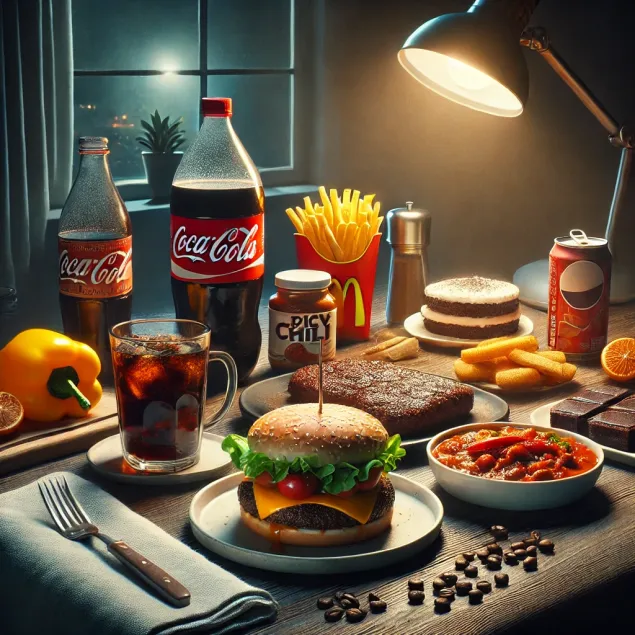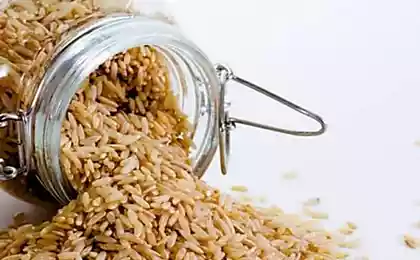217
12 foods that you should not eat at night!

Nutritionists are advised to eat dinner at least 4 hours before bedtime, because it takes the body so much time to digest food and properly absorb all the necessary nutrients. But, despite this, often at night we consume foods that negatively affect our health and interfere with proper rest. It is known that improper diet before bed can lead to insomnia, overweight, poor digestion and even increased levels of stress. In this article, we will discuss what foods to avoid for dinner to ensure a healthy and restful sleep, as well as improve overall well-being.
 82
82Ecology of life: How does food at night affect your health?
Our eating habits are directly related to sleep quality. Digestion, like all other processes in the body, does not stop, even when we go to rest. If you have dinner too late or eat something heavy, your digestive system continues to work, which can lead to bloating, heartburn, or other unpleasant symptoms. In addition, certain foods can affect levels of hormones that regulate sleep, such as insulin levels that rise after carbohydrate consumption. Digestion at night can interfere with deep and full sleep, which, in turn, affects the restoration of energy and internal balance of the body.
12 foods that are strictly forbidden to eat at night
1. Fatty meat products
Fatty meats such as pork, beef or sausages require long digestion, which leads to overload of the digestive system. If you eat fatty meat for dinner, your body will actively digest food at a time when you need to rest. This can cause digestive problems, insomnia and even raise cholesterol levels.
2. Sweet desserts
Foods high in sugar, such as pies, cakes or sugary cookies, increase blood sugar levels and can cause insulin release. This can disrupt the sleep process, as blood sugar levels will fluctuate throughout the night, preventing you from relaxing and falling asleep.
3. Alcohol
Although alcohol can help you relax at first, its consumption at night has a devastating effect on sleep quality. Alcohol reduces the level of deep sleep phases, which leads to frequent awakenings and feelings of fatigue in the morning. Alcohol also causes dehydration, which interferes with the recovery of the body at night.
4. Coffee and strong tea
Caffeine and theine are stimulants that can disrupt your sleep cycle if they enter the body even hours before bedtime. These substances stimulate the nervous system, increase energy levels and make you more alert, which is absolutely not suitable before bedtime. It is better to replace coffee and tea with herbal teas or water, so as not to disturb the quality of sleep.
5. White bread and pastries
Foods containing white flour, such as white bread or fresh pastries, are easily digested, but cause sharp spikes in blood sugar levels. This, in turn, can lead to nighttime awakenings, overeating and digestive problems.
6. Spicy food
Spicy foods stimulate the production of stomach acid, which can lead to heartburn and discomfort during sleep. Consuming spicy food at night also contributes to an increase in body temperature, which disrupts the process of falling asleep.
7. High-fat dairy products
Although milk and cheese contain calcium, which helps to relax, they can also be heavy to digest, especially if they are high in fat. This can lead to digestive problems and even cause insomnia. If you want to relax before bed, it’s best to choose low-calorie dairy products like yogurt or cottage cheese.
8. High-acid fruits
Citrus fruits, such as oranges, lemons and grapefruits, contain large amounts of acid, which can irritate the stomach lining and lead to heartburn. It is best to eat these fruits in the morning, and at night prefer less acidic fruits, such as apples or pears.
9. fast food
Fast food is one of the worst options for dinner. These products contain a large amount of fat, salt and sugar, which negatively affect the process of digestion and sleep. Fast food causes a feeling of heaviness in the stomach and can disrupt your well-being and sleep.
10. Sweet carbonated drinks
Soda containing sugar and carbon dioxide can cause bloating, explosions of energy and disruptions in blood sugar levels. These drinks not only interfere with good sleep, but also contribute to weight gain with regular use.
11. Chewing gum
Chewing gum can cause excessive production of saliva and gases in the stomach, which can disrupt sleep. Also, the process of chewing can “turn on” your body in an active mode, which prevents you from relaxing before bedtime.
12. High-fat nuts
Nuts are a useful source of fat, but their consumption at night can lead to an overload of the digestive system. Nuts require prolonged digestion, which can cause discomfort during sleep and even insomnia. It is best to enjoy nuts in the morning when your body is ready to process them.
Conclusion
What we eat before bed plays a huge role in the quality of our sleep and overall well-being. Some foods, without which we can not imagine your evening, can actually cause insomnia, excess weight and digestive problems. Dinner should be light, nutritious and easily digestible to help the body recover and provide proper rest. Remember that the best strategy is to have dinner a few hours before bed and avoid heavy, fatty, or sugary foods before going to bed.
Beca Oliveira: Model, Traveler and Seeker of New Impressions
Why are some spots on the body so painful?























